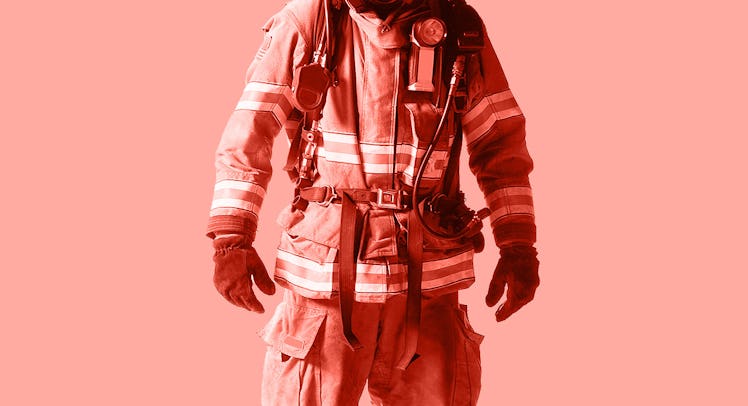Overheated Firefighters Battle Flames, Male Infertility
Firefighters frequently struggle with male infertility, due in large part to heat exposure.

With wildfires threatening northern California and Los Angeles and climate scientists suggesting that flames might be the new normal, firefighters are in the spotlight. Often lionized for their courage, those tasked with combatting combustion actually risk more than many people fully understand. Firefighters suffer significantly higher rates of cancer than the general population and are more likely to die of heart and respiratory disease. That’s the cost of inhalation and hard work. But there are hidden costs as well. Many firefighters quietly struggle with male infertility, due in large part to heat exposure.
“The most obvious threat to fertility among male firefighters is their frequent exposure to extreme heat,” Kajsa Petersen of the Danish Cancer Society Research Center told Fatherly. Peterson recently conducted the first large-scale study of male infertility among firefighters. After examining a cohort of nearly 5,000 Danish firefighters, she concluded that “full-time firefighting was associated with a greater risk of being diagnosed with male-factor infertility.”
Physicians aren’t surprised by this news. Testicles are housed in the scrotum, away from the body, precisely because sperm flourish at lower temperatures. Prolonged exposure to heat is a known risk factor for male infertility, which is why urologists don’t love laptops. And for firefighters there’s an impossible choice: overheat in firefighting equipment, or burn up without it. “Firefighters spend hours in dense, heavy suits that do not allow their bodies to breathe, increasing the temperature of the testicles,” says Dr. Robert J. Valenenzuela, a urologist at the Icahn School of Medicine at Mount Sinai Medical Center.
Peterson has concluded from her work that the main cause of infertility among firefighters is heavy suits, which are sometimes made even hotter by proximity to a blaze. “Maturing sperm cells are highly sensitive to increases in temperature and suffer damage with prolonged exposure to heat,” she says. “Firefighters are exposed to heat either radiating directly from fires, through heavy physical activity in protective clothing wearing heavy gear, or in saunas used for detoxing after incidents.”
That’s not it though. Naturally, the chemical exposures and stress that are part of a firefighter’s lifestyle do not help, and “may contribute to a reduction in the reproductive capacity in these men,” Peterson says.
Unfortunately, solutions are not forthcoming. Peterson cautiously suggests that firefighters minimize heat exposure around their packages, but this may not be realistic. “Measures taken to minimize exposures could include changes in fire attack strategies, changes in use and maintenance of protective equipment, and reconsidering saunas after incidents,” she says.
Meanwhile, the fact that firefighters face more fertility challenges than the general population is a significant public health concern — from both a fertility and mental health perspective. Peterson hopes that raising awareness of the hazards may mitigate some of the angst that comes with infertility within this population. “Experiencing problems with infertility often has great psychological consequences for those involved,” she says. “Awareness of a potential occupational factor may ease the burden of a failure you would otherwise accept as your own.”
This article was originally published on